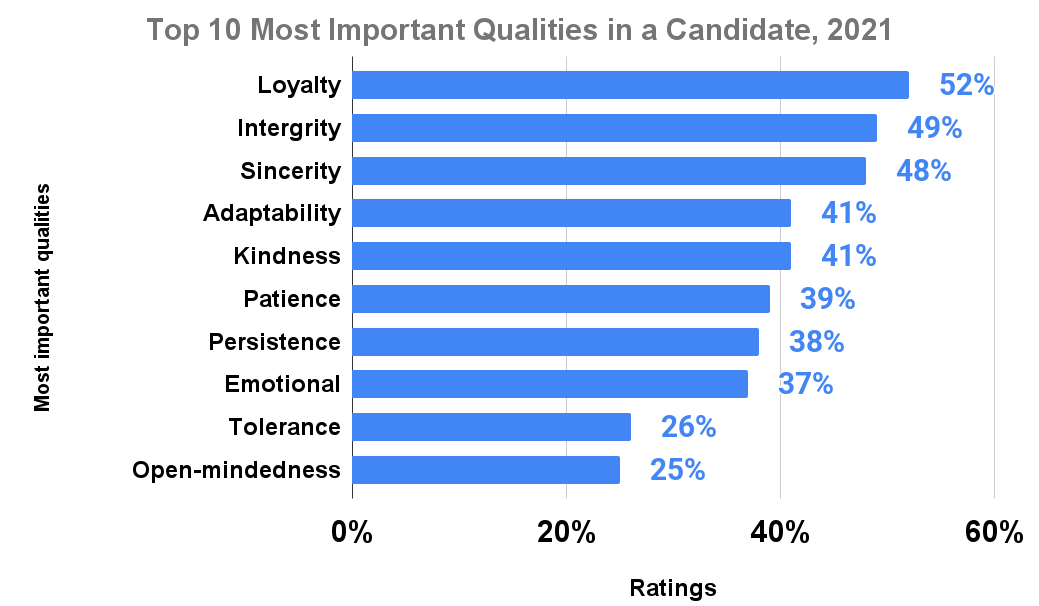7 Crucial Signs Your Boss Trusts You
WhatToGetMy Instructional Article
The foundation of every effective work relationship is built on trust. At the root of trust is the question “how dependable is this person?”. For many bosses, the questions they ask often are; 1) Will my employees have the interest of the business at heart, 2) will they perform their duties diligently and effectively as my business demands, and 3) will they contribute positively to my business. If you think you are doing a pretty good job at convincing your boss to trust you but you are not sure s/he does, you’ll find 7 important signs your boss trusts you in this article.
We will be dealing with the topic under 3 subheadings;
- How to develop trust with boss
- How to know your boss trusts you
- How to win back your boss’s trust
We will start by emphasizing that there is no free trust
Check out the 10 top qualities recruiters look out for in potential employees by zety.com below.
If you look at the first three qualities, you will notice that they are more rooted in trust. Multiple studies have pinpointed these qualities and many others such as safety, honesty, hard-working, consistency, support, and social response to be embedded in trustworthiness which is a primary source of credibility. A sincere employee is someone that can be trusted, so also an employee who is loyal and has integrity. Ask yourself this question, ‘can I be relied on?’
HOW TO DEVELOP TRUST WITH BOSS
If you reflect back at your interview, you’ll remember that you were chosen because you convinced your employer that you were the best candidate for the job. You displayed qualities that your boss or recruiter found likable and promising. Now, ask yourself this honest question “am I living up to the expectations for which I was employed and for which I promised to live up to?”
You develop trust with your boss by proving that you are who you say you are and you can do what you say you can do. This makes you credible. Credibility is when a person keeps his word and fulfills their promised obligations (Jiang, 2011). Such a person is predictable and can be confidently relied on. Serrat (2017) notes that credibility is made of four attributes: integrity, intent, capability, and results.
1. Integrity is simply living up to your standards and the standards of the business. Integrity points to morals. What are your moral values as a person and what morals are expected of you as an employee? Can the boss trust that you will not steal from his business? Can your boss trust his business secrets with you? Can your boss trust that you will be working during work hours instead of browsing on social media and running personal errands? A study noted that employees with high integrity are more rational, honest, and independent when compared to employees with low integrity. You develop trust with your boss by being a person of integrity. Your boss will trust you when they trust your character when they trust that you are who you said you are.
2. Intent refers to your motives, agenda, and resulting behavior for working your job. What are your true reasons for doing the job you are doing? It could be for financial reasons but do you have other motivates? If you apply for a job at a famous bakery store, are your main motives ‘to learn their recipes, quit and start my own business’? You develop trust with your boss when they can see your actions are for the betterment of their business since actions are proof of intent. If your boss has the feeling that you will quit at any time, it might be difficult for them to trust you.
3. Capability refers to your skills, knowledge, attitude, and talents and how you use them. Are you good at your duties? Are you a good auditor, writer, cleaner, sales attendant, etcetera? What are your strengths and weaknesses? Do you capitalize on your strengths and make up for your weaknesses? Are you consistently improving and bettering your skills for the good of the business and yourself? Can your boss trust you to perform a duty effectively and efficiently?
4. Results are visible or tangible contributions you have made to the business. Results solidify your reputation within the company or business. Your boss will take you more seriously when they see results.
If you want to develop trust with your boss, work on being credible. Developing trust is most critical at the start of any work relationship.
HOW TO KNOW YOUR BOSS TRUSTS YOU
The easiest way to know if a person trusts you is by identifying the feelings associated with trust. When you trust a person, how do you feel around them? Some of the emotions associated with the feeling of trust include happiness, gratitude, predictability, vulnerability, security, confidence, acceptance, interest, admiration, contentment, and satisfaction. Therefore if your boss trusts you,
1. They will push hard or sensitive jobs to you
If your boss trusts you, s/he will see you as a go-to person when hard or sensitive jobs need to be done. This is because they feel safe leaving such tasks with you. They know that you will execute it to perfection. This means they can predict the quality of your output.
2. They have high expectations of you
When a boss trusts you, they have high expectations of you. These expectations stem from your actions and performance over time in their company. You’ve set such high standards for yourself that they do not see you going below such standards. They see you as predictable and feel like they have a productive relationship with you. if even you fall short of your high standards, they will be worried and speak to you about it and communicate with you to be in the loop of what’s happening in your life that may be affecting your productivity. They are inclined to be more understanding towards you than lower-performing staff.
3. You are often seen as the benchmark
If your boss often uses you and your work as a standard for other employees to follow, it is a sign of trust. Some bosses try to motivate their employees by using one as an example of what is expected. They might even give that employee some incentives to the knowledge of other employees. If your boss chips in your achievements when addressing clients or other staff members, he admires your efforts and trusts your drive.
4. Provides less supervision
Usually, when bosses are confident of an employee, they supervise that employee less. They believe that such employee knows what they are doing and if ever they feel stuck, they will come to them for help. If ever you were wondering why your boss pays more attention to the work of your colleagues and little attention to yours, it may just be because they know what you are capable of doing. They trust you.
5. They can vouch for you and therefore recommend you
Let’s say that a new client approaches your boss in search of certain expertise, and your boss confidently refers to that client to you and speaks highly of you. It means that he trusts you. He is excited about you as an employee and sees you as valuable. With how highly he rates you, he will not want to lose you as an employee. This also means that it will be difficult for people to accuse you of wrongdoing and it sticks.
6. They value your opinion
When an employee’s work ethic and formula yield results over and over again, it is quite easy to trust the intentions of that employee. It sends a message that such an employee is competent and has the interest of the company and boss at heart. There are times when such an employee might be unaware of the quality of their output, but those who monitor the business’s progress and employees are well aware. If your boss seeks your opinion about certain business decisions, it means that he is confident of you and satisfied with your output thus far.
7. They feel freer around you and might confide in you once in a while
Even if your boss is generally nice, it doesn’t mean that he relates to everyone on the same level. If he freely shares certain personal information with you when you ask about his wellbeing, it is a sign of trust.
It is important to note that trust comes in different levels and aspects. Your boss can trust you in one area and not in the other area. For example, your boss may trust your effectiveness and efficiency but may not trust you with certain business secrets. Rather, he will trust another employee in that area. This level of trust stems from his evaluations of both your personality and your work ethics and it is quite different to separate the two to an extent.
HOW TO WIN BACK YOUR BOSS’S TRUST
When trust is lacking, processes get slowed down. Lack of trust harms the work climate. It makes it less conducive for the trustee and trustor. This eventually hampers productivity. If you notice that your boss is struggling to trust you, here are a couple of things you should do that could encourage trust;
1. Sit up on your job
If the lack of trust is stemming from the quality of your work or the level of your output, make an effort to improve. Be very attentive to what they are drawing your attention to, and seek ways that could help you improve your productivity. Take it a step at a time. When they see that you are making an effort, they will give you a break. If you are the slow type of work, you may need to burn extra fuel at night to catch up. This article on how to stay up all night for work will be of help to you.
2. Set realistic goals and standards for yourself
Bosses usually hold employees by their promises and assurances. Why make a promise and fail to fulfill it? It is important to measure your strength accurately and set your goals by it. It’s best to achieve your goals and have your boss thinking that you could do more than fail to achieve your goals and have your boss lose faith in you.
3. Communicate
It can be frustrating for any boss to have employees who keep to themselves yet fail to meet standards. You must keep your boss in the loop. Communicate problems well in advance than apologize for falling short of expectations. Communicating with your boss helps him or her to understand you better. It tells them that you value them and your job. Communication brings about transparency.
4. Understand your boss values and demands
If you do not know or care to understand what your boss values in his business, you will always conflict with him or her. Secondly, you will not be able to anticipate their needs and that of the organization. Pay attention to their expectations for you as an employee and their standards for their business. Try your best to meet up with that standard and if you cannot cope, be truthful to yourself and your boss even if it means resigning. It is better than earning yourself a bad reputation.
5. Be truthful
Usually, trust diminishes when a person gets the impression that the other party is dishonest. You do not want to create an impression of being a dishonest person. Therefore be mindful of your actions, keep a good account of them to defend them if need be, and lastly, be plain about your intentions. This will help your boss understand why you have taken certain decisions or acted in certain ways.
FREQUENTLY ASKED QUESTIONS
1. How do you know if your boss is pushing you out?
When his or her actions are beginning to make things unbearable for you at work and you can tell that they are doing it deliberately, it is a good time to speak up about your observation and probably make the hard decision to dust your shoes and move on if you have to. Examples of things to look out for when your boss is trying to push you out are;
- Exaggerates your errors
- Give a cold shoulder
- Acts like you do not exist in the company or business
- Purposely praises other employees and shows more warmth towards them to make you feel irrelevant
- Shows little concern for your misfortunes
- Tries to exclude you from activities.
2. Is it better to quit or be fired?
Most often, being fired sends the wrong signal to future employers. It brings the feeling of doubt which is not a good position to place yourself in except you are guiltless and you can firmly defend yourself. We will advise that if situations are no longer favorable between you and your employer, and there is no glimmer of hope in that situation, it is best to walk away dignified.
CONCLUDING REMARK
Trust is a crucial part of every work relationship and should consistently be worked on for the betterment of the parties involved. You gain trust with your boss by showing yourself credible. This involves meeting expectations and having the right values. Your boss can trust you in one area and not the other. This is based on his assessment of your personality and work ethic. By paying attention to the values and qualities your boss desires, you might be able to improve your work relationship with him.
REFERENCE
1. Spector, M. D., & Jones, G. E. (2004). Trust in the workplace: Factors affecting trust formation between team members. The Journal of social psychology, 144(3), 311-321.
2. Serrat, O. (2017). Building trust in the workplace. In Knowledge Solutions (pp. 627-632). Springer, Singapore.
3. Rahim, Omar, & Kamaniddin, (2020). Integrity and Employee Job Performance. Journal of Critical Reviews 7(16).
01 HOUR 30 MINUTES
ESTIMATED TIME DESIGNING AND UPLOADING THIS ARTICLE
10 HOURS 59 MINUTES
ESTIMATED TIME RESEARCHING AND WRITING THIS ARTICLE
You Might Also Like

Funny Things to Do on Your Last Day at Work
8 of The Best Funny things to do on your last day at work WhatToGetMy Instructional Article You have worked your notice period at work and your last day has finally arrived. But you feel that you are in two minds about how to spend

What to Do When People Don’t Respect You
What to Do When People Don’t Respect You WhatToGetMy Instructional Article Wanting to be respected is a normal and natural human feeling and there is nothing wrong with you wanting to be respected. When people disrespect you, it is either because they are the problem




